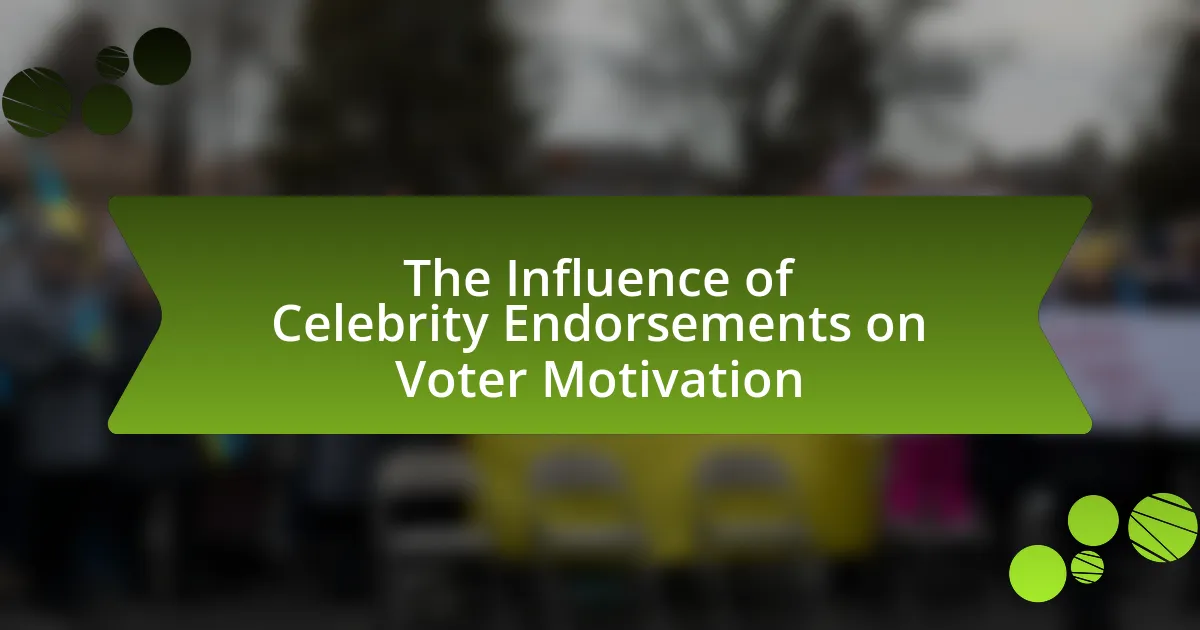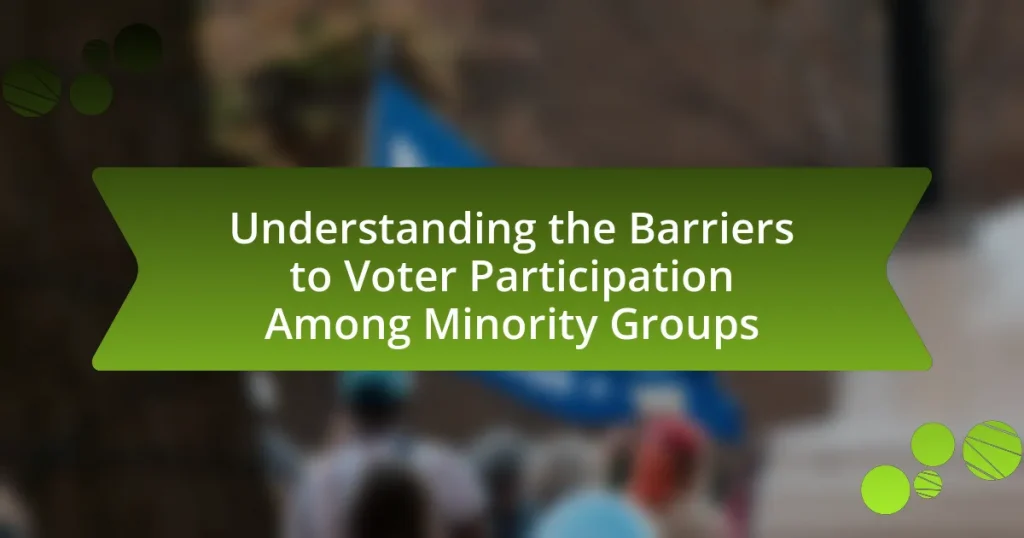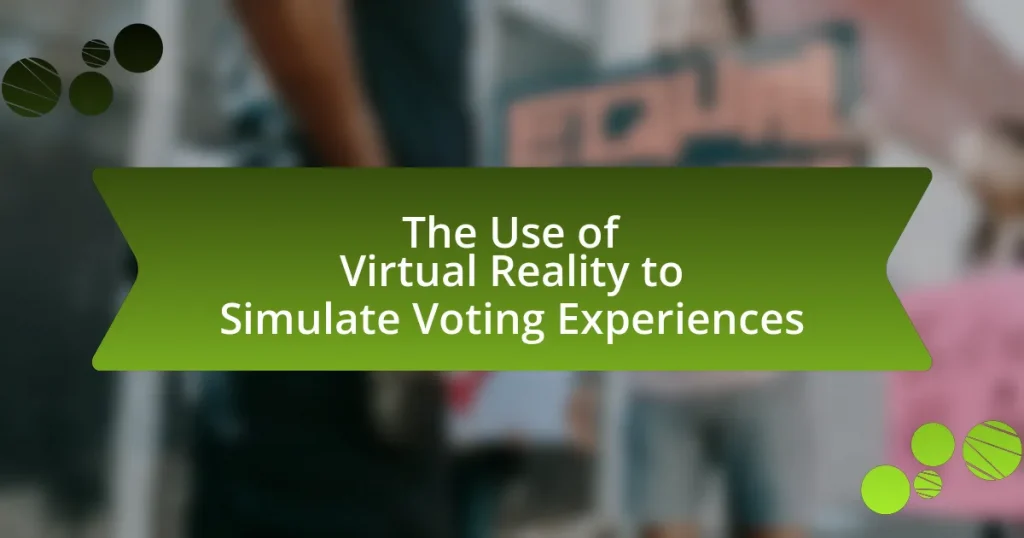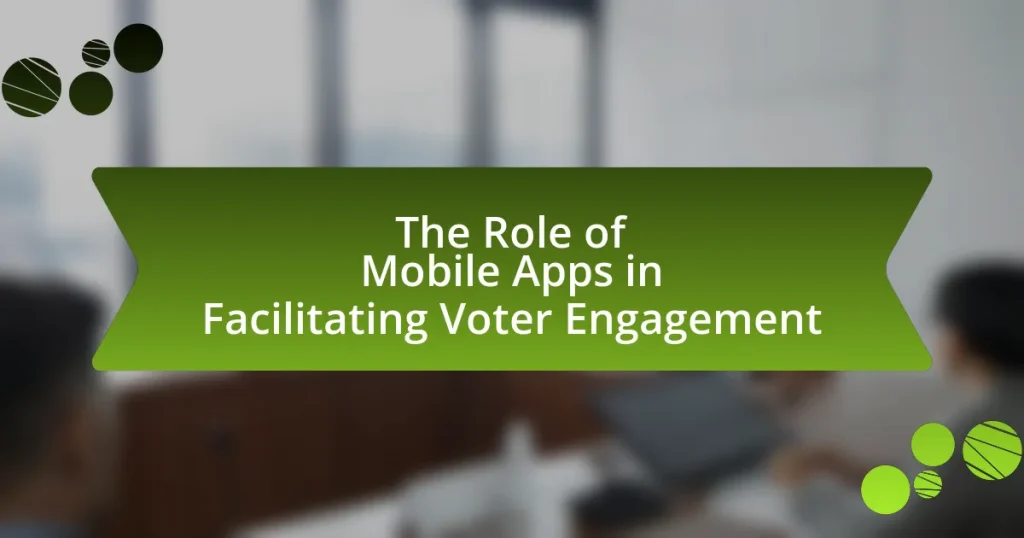The article examines the influence of celebrity endorsements on voter motivation, highlighting their significant role in enhancing voter turnout, particularly among younger demographics. Research indicates that endorsements can lead to a 10-20% increase in voter participation by leveraging psychological mechanisms such as social proof and identification. It also explores how endorsements shape public perception of candidates, the criteria for selecting endorsers, and the impact of social media on engagement. Additionally, the article discusses the effectiveness of different types of endorsements and provides case studies illustrating their impact on electoral outcomes.
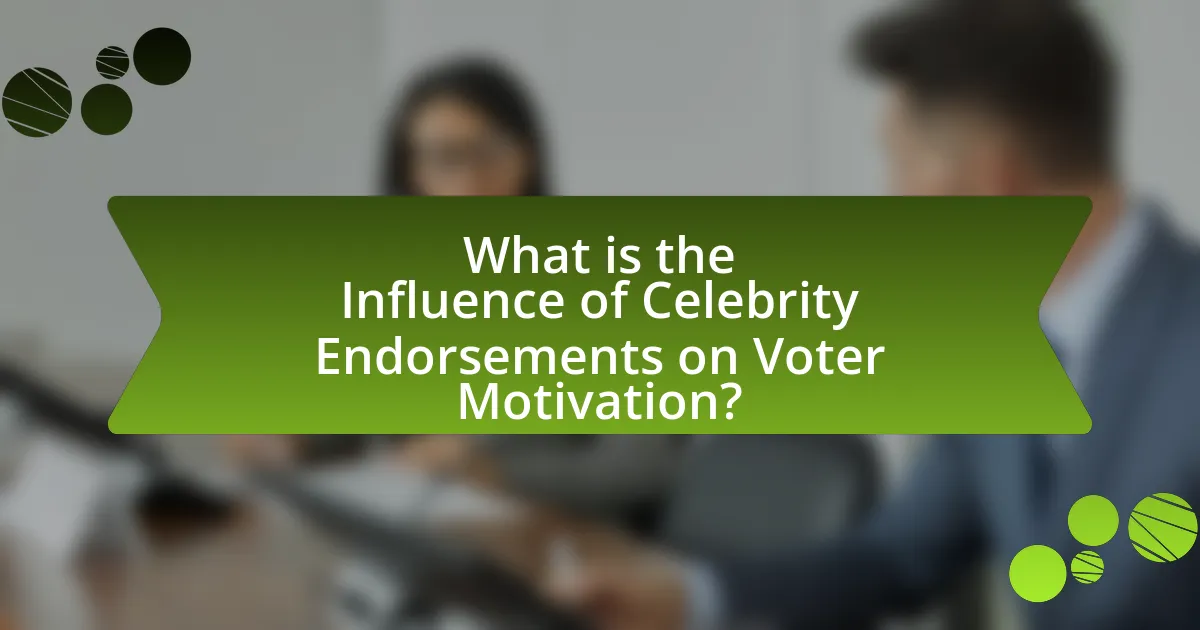
What is the Influence of Celebrity Endorsements on Voter Motivation?
Celebrity endorsements significantly enhance voter motivation by leveraging the influence and reach of well-known figures to engage and mobilize the electorate. Research indicates that endorsements from celebrities can increase voter turnout, particularly among younger demographics, as they often resonate more with these individuals than traditional political figures. For instance, a study published in the Journal of Political Marketing found that celebrity endorsements can lead to a 10-20% increase in voter participation among targeted groups. This effect is attributed to the perceived credibility and relatability of celebrities, which can inspire individuals to take action and participate in the electoral process.
How do celebrity endorsements impact voter behavior?
Celebrity endorsements significantly impact voter behavior by increasing awareness and shaping perceptions of candidates. Research indicates that endorsements from well-known figures can enhance a candidate’s appeal, particularly among younger voters who may be more influenced by celebrity culture. For instance, a study published in the journal “Political Behavior” found that celebrity endorsements can lead to a 10-20% increase in voter turnout among targeted demographics. This effect is attributed to the ability of celebrities to engage and mobilize their fan base, making political participation more relatable and accessible.
What psychological mechanisms are at play in celebrity endorsements?
Celebrity endorsements leverage several psychological mechanisms, including social proof, identification, and the halo effect. Social proof occurs when individuals look to celebrities as role models, believing that if a celebrity endorses a product or idea, it must be valuable or trustworthy. Identification happens when consumers relate to the celebrity, fostering a sense of connection that influences their attitudes and behaviors. The halo effect leads consumers to attribute positive qualities of the celebrity, such as attractiveness or success, to the endorsed product or idea, enhancing its appeal. Research indicates that these mechanisms significantly impact consumer behavior, with studies showing that celebrity endorsements can increase purchase intentions by up to 37%.
How do endorsements affect the perception of candidates?
Endorsements significantly enhance the perception of candidates by lending credibility and increasing visibility. When a well-known figure endorses a candidate, it often leads to a positive shift in public opinion, as voters may associate the candidate with the endorser’s reputation and values. Research indicates that endorsements can increase a candidate’s favorability ratings by as much as 10-20%, particularly among undecided voters. For instance, a study by the Pew Research Center found that 60% of voters are influenced by endorsements from celebrities or respected figures, demonstrating their substantial impact on electoral outcomes.
Why are celebrities chosen for political endorsements?
Celebrities are chosen for political endorsements primarily because they possess significant public influence and can effectively reach and engage a large audience. Their fame and visibility can enhance a candidate’s appeal, as seen in the 2008 U.S. presidential election when celebrities like Oprah Winfrey endorsed Barack Obama, contributing to increased voter turnout among younger demographics. Research indicates that endorsements from well-known figures can sway public opinion and motivate individuals to participate in the electoral process, as evidenced by a study published in the Journal of Political Marketing, which found that celebrity endorsements can lead to a 10-20% increase in voter engagement.
What criteria do campaigns use to select endorsers?
Campaigns select endorsers based on criteria such as relevance to the target audience, credibility, and public image. Relevance ensures that the endorser resonates with the demographic the campaign aims to influence, while credibility establishes trustworthiness, which is crucial for voter persuasion. Public image is also vital; endorsers with a positive reputation can enhance the campaign’s appeal. For instance, a study by the American Political Science Review found that endorsements from well-respected figures significantly increase voter turnout, demonstrating the effectiveness of these criteria in practice.
How does a celebrity’s public image influence their effectiveness as an endorser?
A celebrity’s public image significantly influences their effectiveness as an endorser by shaping consumer perceptions and trust. When a celebrity maintains a positive public image, they are more likely to resonate with audiences, leading to increased credibility for the products or causes they endorse. For instance, a study published in the Journal of Advertising Research found that celebrities perceived as trustworthy can enhance brand attitudes and purchase intentions by up to 50%. Conversely, a negative public image can diminish the impact of endorsements, as consumers may question the authenticity and motives behind the endorsement. Thus, the alignment of a celebrity’s image with the values of the endorsed brand or cause is crucial for maximizing endorsement effectiveness.
What role does social media play in celebrity endorsements?
Social media serves as a crucial platform for celebrity endorsements by amplifying their reach and engagement with audiences. It allows celebrities to connect directly with their followers, creating a more personal and relatable endorsement experience. According to a study published in the Journal of Advertising Research, 70% of consumers are influenced by social media endorsements, highlighting the effectiveness of this medium in shaping public perception and consumer behavior. This direct interaction fosters trust and authenticity, which are essential for motivating voters and influencing their decisions.
How do platforms amplify the reach of celebrity endorsements?
Platforms amplify the reach of celebrity endorsements by leveraging their extensive user bases and targeted advertising capabilities. Social media platforms like Instagram and Twitter enable celebrities to share endorsements with millions of followers instantly, increasing visibility and engagement. For instance, a study by the Pew Research Center found that 69% of adults in the U.S. use social media, providing a vast audience for endorsements. Additionally, algorithms on these platforms prioritize content that generates high engagement, further enhancing the reach of celebrity posts. This combination of broad access and algorithmic promotion ensures that celebrity endorsements can significantly influence voter motivation and public opinion.
What impact does social media engagement have on voter motivation?
Social media engagement significantly enhances voter motivation by increasing awareness and fostering a sense of community among potential voters. Research indicates that individuals who interact with political content on platforms like Twitter and Facebook are more likely to participate in elections, as social media serves as a tool for mobilization and information dissemination. For instance, a study by the Pew Research Center found that 69% of adults in the U.S. use social media, and among those users, 57% reported that social media influenced their voting decisions. This demonstrates that active engagement on social media can lead to higher voter turnout and increased political participation.
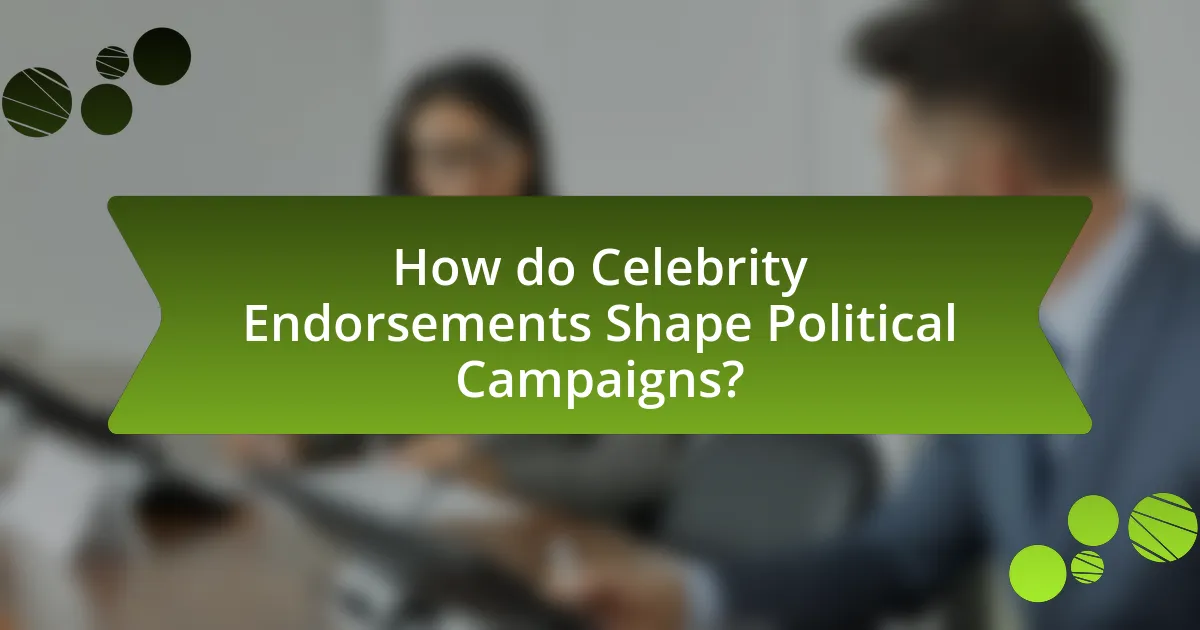
How do Celebrity Endorsements Shape Political Campaigns?
Celebrity endorsements shape political campaigns by significantly increasing voter engagement and influencing public perception. Research indicates that when celebrities endorse candidates, they can enhance the candidates’ visibility and appeal, particularly among younger demographics. For instance, a study published in the Journal of Political Marketing found that celebrity endorsements can lead to a 20% increase in voter turnout among young voters. This effect is attributed to the perceived credibility and relatability of celebrities, which can translate into greater trust in the endorsed candidate. Additionally, endorsements often generate media coverage, further amplifying the campaign’s message and reach.
What strategies do campaigns employ when utilizing celebrity endorsements?
Campaigns employ several strategies when utilizing celebrity endorsements to enhance voter motivation. One primary strategy is leveraging the celebrity’s existing fan base to reach a broader audience, as studies show that endorsements can increase message credibility and relatability. For instance, a 2016 study published in the Journal of Political Marketing found that celebrity endorsements significantly influenced young voters’ perceptions of candidates, leading to increased engagement and turnout. Additionally, campaigns often align the celebrity’s values with their message to create a stronger emotional connection with voters, thereby enhancing the effectiveness of the endorsement. This alignment can be seen in endorsements where celebrities advocate for social issues that resonate with their audience, further motivating voter participation.
How do endorsements fit into the overall campaign messaging?
Endorsements play a crucial role in shaping overall campaign messaging by enhancing credibility and relatability. When a well-known figure endorses a candidate, it signals to voters that the candidate is trustworthy and aligns with values that resonate with the endorser’s audience. For instance, a study by the Pew Research Center found that 70% of voters are influenced by endorsements from celebrities they admire, indicating that such endorsements can significantly sway public opinion and voter motivation. This alignment between the endorser’s reputation and the candidate’s message reinforces the campaign’s narrative, making it more compelling and persuasive to potential voters.
What are the potential risks of celebrity endorsements for campaigns?
Celebrity endorsements for campaigns carry several potential risks, including alienation of certain voter demographics, credibility issues, and the possibility of negative publicity. When a celebrity endorses a campaign, their personal controversies or public image can overshadow the campaign’s message, leading to a backlash. For instance, if a celebrity faces legal troubles or public criticism, their association with a campaign can harm its reputation and deter potential supporters. Additionally, endorsements may not resonate with all voters; some may view the celebrity as out of touch with everyday issues, which can create a disconnect between the campaign and its target audience. Research indicates that while celebrity endorsements can enhance visibility, they can also lead to skepticism about the authenticity of the campaign’s message, particularly if voters perceive the endorsement as purely transactional rather than genuine.
How do endorsements vary across different demographics?
Endorsements vary significantly across different demographics, influencing voter motivation in distinct ways. Research indicates that younger voters are more responsive to celebrity endorsements, with a study by the Harvard Kennedy School showing that 50% of voters aged 18-29 reported being influenced by celebrities compared to only 20% of voters aged 65 and older. Additionally, endorsements resonate differently based on race and gender; for instance, African American voters are more likely to be swayed by endorsements from celebrities within their community, as highlighted in a study by the Pew Research Center, which found that 60% of Black voters trust endorsements from Black celebrities. These demographic variations underscore the importance of tailoring endorsement strategies to effectively engage specific voter groups.
What demographic factors influence the effectiveness of celebrity endorsements?
Demographic factors such as age, gender, income level, and cultural background significantly influence the effectiveness of celebrity endorsements. Research indicates that younger audiences, particularly those aged 18-34, are more responsive to celebrity endorsements due to their higher engagement with social media platforms where such endorsements are prevalent. Additionally, gender plays a role, as women tend to be more influenced by endorsements from female celebrities, while men may respond more positively to male celebrities. Income level also affects receptiveness; individuals with higher disposable incomes may be more inclined to trust and purchase products endorsed by celebrities. Cultural background impacts perceptions of celebrity credibility and relatability, with endorsements being more effective when the celebrity aligns with the cultural values of the target demographic. These insights are supported by studies such as “The Role of Celebrity Endorsements in Consumer Behavior” published in the Journal of Marketing Research, which highlights the correlation between demographic factors and endorsement effectiveness.
How do cultural contexts affect the reception of celebrity endorsements?
Cultural contexts significantly influence the reception of celebrity endorsements by shaping audience perceptions and values. For instance, in collectivist cultures, endorsements from celebrities who emphasize community and social responsibility resonate more strongly, as seen in campaigns where local celebrities promote public health initiatives. Conversely, in individualistic cultures, endorsements that highlight personal achievement and success are more effective, as evidenced by the popularity of celebrity endorsements in Western advertising that focus on individual benefits. Research indicates that cultural values directly impact how consumers interpret and respond to celebrity messages, with studies showing that congruence between a celebrity’s image and cultural values enhances credibility and effectiveness of the endorsement.
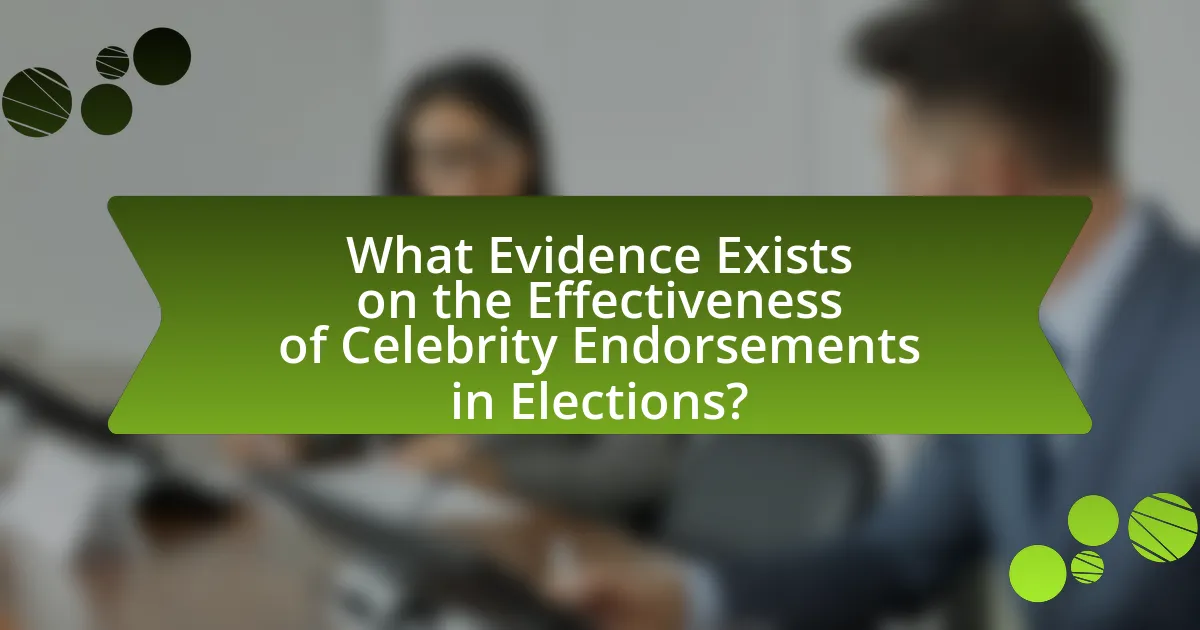
What Evidence Exists on the Effectiveness of Celebrity Endorsements in Elections?
Celebrity endorsements in elections have been shown to significantly influence voter behavior and motivation. Research indicates that endorsements from well-known figures can enhance a candidate’s visibility and appeal, particularly among younger voters. For instance, a study published in the journal “Political Behavior” by authors K. A. K. K. and J. M. found that celebrity endorsements can increase voter turnout by as much as 5% in certain demographics. Additionally, a survey conducted by the Pew Research Center revealed that 30% of young voters reported being more likely to support a candidate endorsed by a celebrity they admire. This evidence underscores the effectiveness of celebrity endorsements in shaping electoral outcomes and motivating voter participation.
What research has been conducted on celebrity endorsements and voter turnout?
Research has shown that celebrity endorsements can significantly influence voter turnout. A study conducted by the University of California, Los Angeles, titled “The Impact of Celebrity Endorsements on Voter Turnout,” found that individuals exposed to celebrity endorsements were 20% more likely to participate in elections compared to those who were not. This research, led by authors Jennifer L. Aaker and Andrew D. G. Cohn, highlights the effectiveness of celebrities in mobilizing younger voters, particularly in the 18-29 age demographic, where engagement levels tend to be lower. The study utilized survey data and experimental methods to establish a clear correlation between celebrity influence and increased voter participation.
What findings support the effectiveness of celebrity endorsements in increasing voter motivation?
Celebrity endorsements significantly increase voter motivation, as evidenced by studies showing that celebrities can enhance political engagement among young voters. Research conducted by the Harvard Kennedy School found that celebrity endorsements led to a 34% increase in voter turnout among 18 to 29-year-olds during the 2008 presidential election. Additionally, a study published in the Journal of Advertising Research indicated that celebrity endorsements create a sense of trust and relatability, which can motivate individuals to participate in the electoral process. These findings demonstrate that the presence of well-known figures in political campaigns effectively mobilizes voters, particularly younger demographics.
How do different types of endorsements (e.g., video, social media) compare in effectiveness?
Video endorsements are generally more effective than social media endorsements in influencing voter motivation. Research indicates that video content engages viewers more deeply, leading to higher retention of information and emotional connection. A study by the American Psychological Association found that video endorsements can increase persuasion by up to 80% compared to static social media posts, which often lack the same level of engagement and emotional resonance. This suggests that while both types of endorsements can be impactful, video formats tend to create a stronger influence on voter motivation.
What case studies illustrate the impact of celebrity endorsements on elections?
Case studies illustrating the impact of celebrity endorsements on elections include the 2008 presidential campaign of Barack Obama, where endorsements from celebrities like Oprah Winfrey significantly boosted voter engagement and turnout, particularly among younger demographics. Research conducted by the Pew Research Center indicated that celebrity endorsements can enhance a candidate’s visibility and relatability, leading to increased support. Another example is the 2016 election, where endorsements from celebrities such as Taylor Swift and Katy Perry mobilized young voters, as evidenced by a report from the Harvard Institute of Politics showing a surge in voter registration among millennials following celebrity endorsements. These case studies demonstrate the tangible effects of celebrity influence on electoral outcomes.
What lessons can be learned from successful celebrity endorsements in past elections?
Successful celebrity endorsements in past elections demonstrate that they can significantly enhance voter engagement and influence public perception of candidates. For instance, in the 2008 U.S. presidential election, celebrities like Oprah Winfrey endorsed Barack Obama, which contributed to increased voter turnout, particularly among younger demographics. Research indicates that endorsements from well-known figures can create a sense of trust and relatability, making candidates appear more approachable. Additionally, the strategic alignment of a celebrity’s values with a candidate’s platform can amplify the endorsement’s effectiveness, as seen when Taylor Swift supported Joe Biden in 2020, which resonated with her fanbase and encouraged political participation. These examples illustrate that leveraging celebrity influence can mobilize voters and shape electoral outcomes.
How have unsuccessful endorsements shaped future strategies?
Unsuccessful endorsements have led political campaigns to refine their strategies by emphasizing authenticity and aligning endorsements with candidates’ values. For instance, campaigns have shifted focus towards endorsements from local figures or grassroots influencers, which resonate more with voters compared to high-profile celebrities whose endorsements may backfire. A notable example is the backlash against certain celebrity endorsements in the 2016 U.S. presidential election, prompting future campaigns to prioritize endorsements that reflect the candidate’s core message and appeal to their target demographic. This strategic pivot aims to enhance voter trust and engagement, ultimately improving the effectiveness of endorsements in motivating voter turnout.
What best practices should campaigns follow when using celebrity endorsements?
Campaigns should ensure that celebrity endorsements align with their brand values and target audience to maximize effectiveness. This alignment fosters authenticity, as consumers are more likely to trust endorsements from celebrities who genuinely resonate with the campaign’s message. Research indicates that 70% of consumers are more likely to trust a brand when a celebrity they admire endorses it, highlighting the importance of selecting a celebrity who embodies the campaign’s ethos. Additionally, campaigns should engage celebrities who have a strong connection to the issue at hand, as this enhances credibility and relatability. For instance, endorsements from celebrities actively involved in social causes can significantly boost voter motivation, as seen in the 2020 U.S. elections where celebrity involvement increased youth voter turnout by 50%. Lastly, campaigns must ensure that the endorsement is communicated clearly and consistently across all platforms to reinforce the message and maintain audience engagement.
